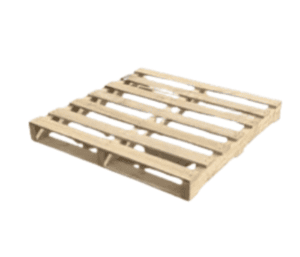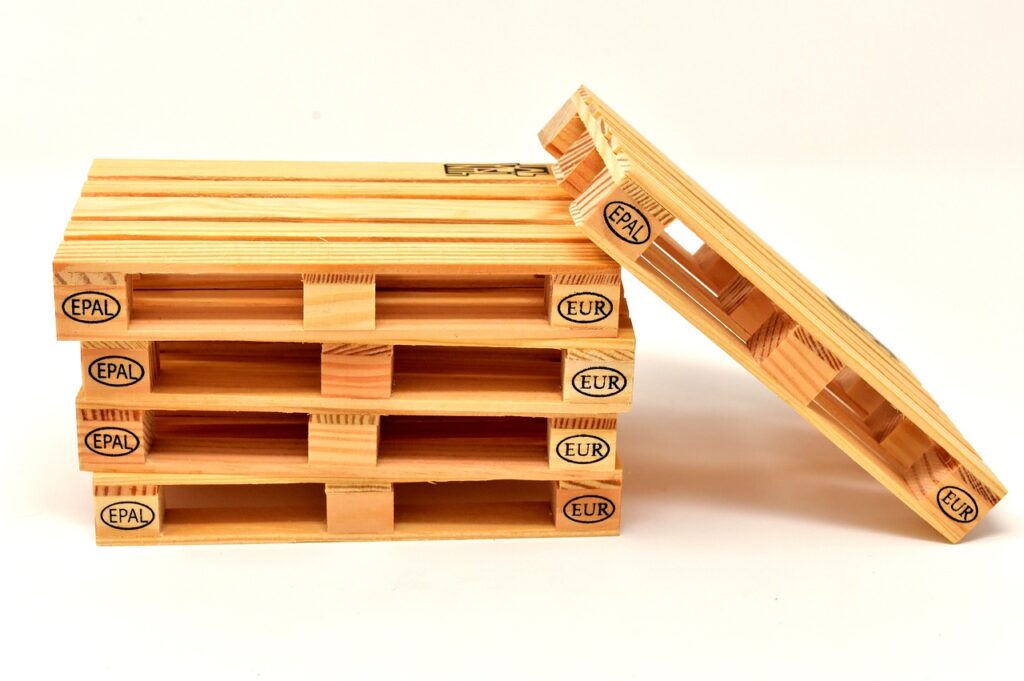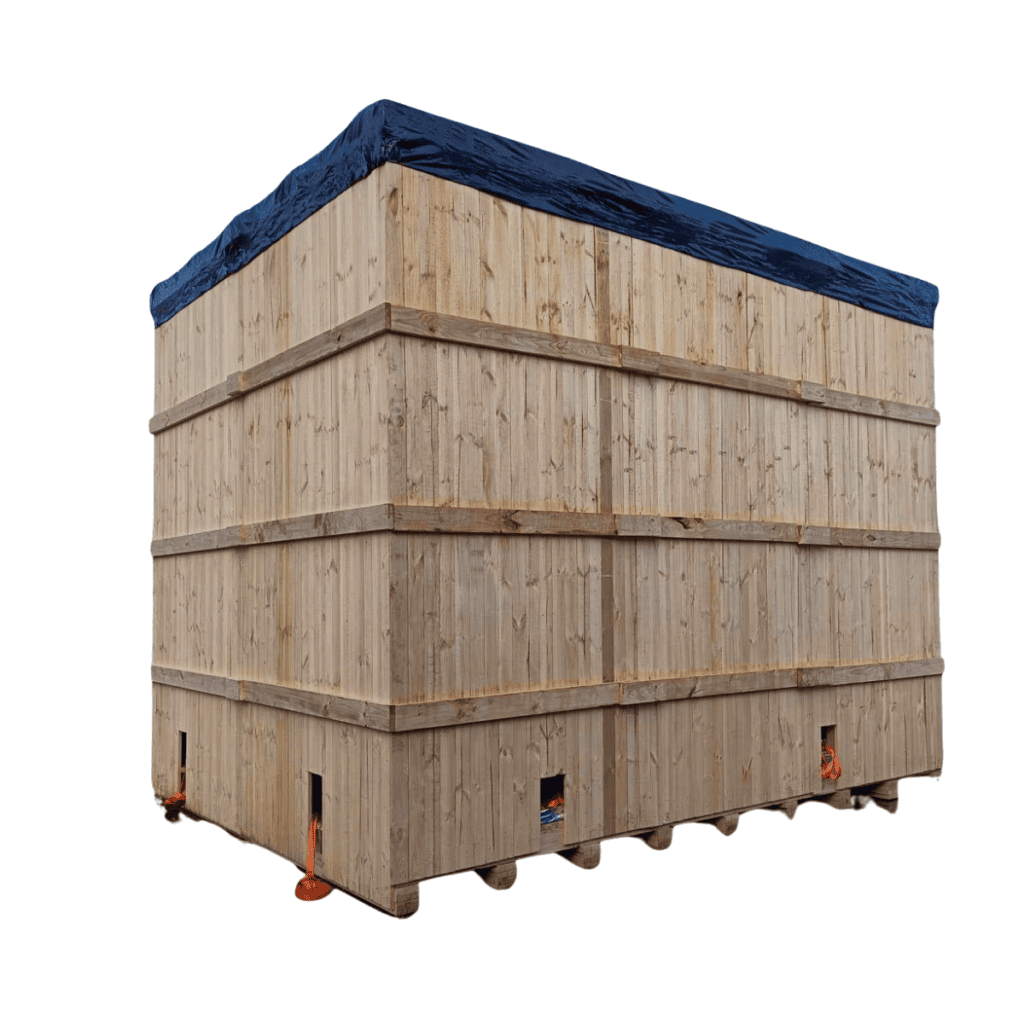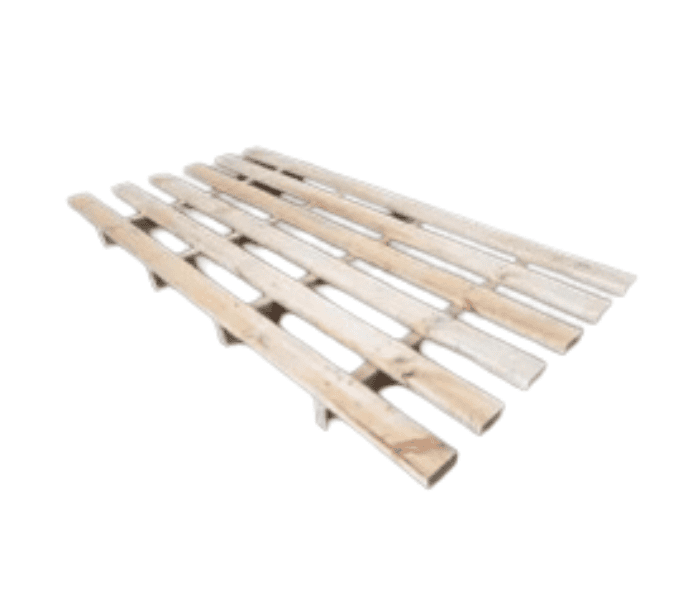Introduction to Pallets
What is a Pallet?
A pallet is a flat, portable platform used as a base for storing, stacking, handling, and transporting goods, typically in warehouses, factories, or during shipment. It serves as a foundation that stabilizes loads, allowing for efficient movement via forklifts, pallet jacks, or other lifting equipment. Pallets play a crucial role in modern logistics and supply chain management, making the handling and storage of goods safer and more organized.
Key Features of a Pallet:
- Flat Surface: Provides stability for items placed on it, preventing products from tipping or shifting during transport.
- Forklift-Ready Design: Pallets have gaps or spaces that allow forklift tines or pallet jack blades to slide in, making it easy to lift and move large, heavy loads.
- Standard Sizes: Pallets often come in standardized sizes, depending on the country or region, to ensure compatibility with shipping containers, trucks, and warehouse racks.
Components of a Pallet:
Deck Boards: These are the flat boards that create the top (and sometimes bottom) surface of the pallet. They provide the surface where goods are placed.
Stringers: The beams that connect and support the deck boards, providing structural integrity to the pallet. In some pallet designs, they allow forklift access from the sides.
Blocks: In block pallets, these are the solid blocks at each corner and center points of the pallet, allowing forklifts to lift from all four sides.
Nails or Fasteners: Nails or staples hold the deck boards and stringers together.
Types of Pallets:
Pallets come in different materials and designs depending on the intended use, industry, or logistical needs.
Wooden Pallets:
- The most common type, known for being affordable and durable.
- Typically made from hardwood or softwood, these pallets can handle heavy loads.
- Recyclable and easily repairable, making them eco-friendly.
- Drawback: Wooden pallets can splinter, warp, or sustain damage from moisture.
Plastic Pallets:
- Made from high-density polyethylene or polypropylene.
- Known for being lightweight, durable, and easy to clean.
- Ideal for industries requiring hygiene, such as pharmaceuticals or food.
- Drawback: Higher upfront cost compared to wooden pallets.
Metal Pallets:
- Constructed from steel or aluminium, these pallets are extremely durable and strong.
- Designed to handle heavy-duty tasks, such as transporting large machinery or heavy materials.
- Drawback: Expensive and heavy, limiting their use to specific industries.
Paper Pallets:
- Made from corrugated paper or cardboard, these pallets are lightweight and eco-friendly.
- Best used for light loads or air freight where weight restrictions apply.
- Drawback: Not as strong or durable as wooden or plastic pallets.
How Pallets are Used:
Pallets are ubiquitous in industries that need to transport or store products. Some common uses include:
- Warehousing: Goods are stacked on pallets to maximize space and efficiency, allowing easy movement around the warehouse with forklifts.
- Shipping: Pallets are loaded onto trucks, ships, or planes for transport, stabilizing loads and protecting goods in transit.
- Display: In retail settings, pallets are sometimes used to display bulk goods, making it easier for workers to restock items.
How Pallets Improve Efficiency:
- Space Utilization: By stacking goods on pallets, businesses can maximize warehouse space and make it easier to store large quantities of items vertically.
- Ease of Handling: Pallets simplify the process of moving heavy loads, reducing the need for manual lifting and minimizing the risk of injury.
- Time Savings: The design of pallets allows for faster loading and unloading times, improving overall efficiency in warehouses and during transportation.
Pallet Construction:
Pallets can be designed in various ways depending on their load-bearing capacity and intended purpose.
- Two-way Entry Pallets: These pallets can be accessed by a forklift or pallet jack from two sides (front and back).
- Four-way Entry Pallets: These pallets allow forklifts to access them from all four sides, providing more flexibility in handling.
History of the Pallet:
The modern pallet originated in the early 20th century, evolving from simple wooden skids used for moving items in factories. The development of forklifts in the 1920s and 1930s spurred the need for more standardized platforms for lifting goods, leading to the creation of the pallet we know today.
During World War II, pallets became widely used by the military to transport supplies quickly and efficiently. Their widespread adoption post-war saw pallets becoming essential in the global logistics industry, playing a pivotal role in the movement of goods worldwide.
What to Look Out for When Inspecting Pallets:
Ensuring pallets are in good condition is crucial for safety and efficiency. Here are things to watch out for:
- Missing Nails: Can lead to instability and compromise the pallet’s structural integrity.
- Uneven or Warped Boards: These can cause loads to shift or fall during handling.
- Splintered or Cracked Wood: Damaged boards can injure workers or damage goods during transportation.
- Signs of Rot or Moisture: Particularly in wooden pallets, exposure to moisture can weaken the pallet and lead to mold or rot.
Pallets are an indispensable component of global trade, offering a reliable way to store and transport goods. Whether you need wooden, plastic, or metal pallets, understanding the key features, types, and maintenance considerations helps you select the right pallet for your business needs.
By choosing high-quality pallets and ensuring regular inspections and repairs, businesses can streamline their logistics operations, safeguard products, and improve overall efficiency. Whether for domestic use or international export, pallets are the backbone of efficient supply chain management.
Pallets are an integral part of modern logistics, allowing goods to be easily stored and transported. They provide a stable base that ensures products are handled efficiently by forklifts, pallet jacks, or cranes. Pallets come in various sizes, materials, and designs, each tailored to different applications and industries.
Types of Pallets
There are several types of pallets available, each suited to specific uses. Here’s a breakdown of the most common types:
Wooden Pallets
Wooden pallets are the most common type, widely used due to their affordability and strength. They can be easily repaired and recycled, making them a sustainable choice.
Plastic Pallets
Plastic pallets are durable, resistant to moisture, and easy to clean, making them ideal for industries where hygiene is a priority, such as food and pharmaceuticals.
Metal Pallets
Metal pallets, usually made of steel or aluminium, are the strongest option, providing durability and longevity. They are commonly used in heavy-duty applications where maximum load-bearing capacity is required.
Paper Pallets
Paper pallets are lightweight and designed for single-use or low-weight loads. They are often used for exporting goods, as they meet the international phytosanitary regulations without the need for heat treatment.
Standard Pallet Sizes
Pallet sizes vary by region and industry, but the most common standard pallet sizes include:
a. Australian Standard Pallet
Dimensions: 1165mm x 1165mm
The Australian Standard Pallet is widely used across the country and fits perfectly within the RACE container used in road and rail transport.

b. Euro Pallet
Dimensions: 1200mm x 800mm
The Euro Pallet is popular across Europe and is used in a wide range of industries.
c. North American Pallet
Dimensions: 48" x 40" (1219mm x 1016mm)
The most common pallet size in North America, primarily used in grocery and retail industries.
d. Custom Pallet Sizes
Many businesses require custom pallet sizes for specific applications. Crate N Pack Solutions offers a range of custom options to suit unique needs.
4. Heat-Treated Pallets for Export
When shipping goods internationally, it’s essential to comply with ISPM 15 regulations. Heat-treated pallets are treated to kill any insects or pests that may be present in the wood. This process ensures that pallets used for export are pest-free and safe for international trade.
At Crate N Pack Solutions, all our export pallets are heat-treated, ensuring compliance with international standards.
Benefits of Wooden Pallets
Wooden pallets offer several key advantages for businesses:
Cost-Effective
Wooden pallets are more affordable than plastic or metal alternatives, making them a cost-effective solution for many industries.
Recyclable
Wooden pallets can be repaired, reused, or recycled into other products like mulch or animal bedding, reducing waste and promoting sustainability.
Customizable
Wooden pallets can be custom-built to suit specific applications, whether it’s for heavy machinery or delicate goods.
Strong and Durable
Wooden pallets are known for their strength and durability, making them suitable for transporting heavy goods over long distances.
Pallet Safety Tips
When using pallets in your operations, it’s important to follow safety guidelines to avoid accidents or product damage:
a. Inspect Pallets Regularly
Regularly inspect pallets for damage, such as cracks or splinters, that could compromise their structural integrity. Replace or repair damaged pallets immediately.
b. Proper Lifting Techniques
Ensure that your team uses proper lifting techniques when handling pallets to prevent injury. Forklifts and pallet jacks should be used whenever possible.
c. Stack Pallets Correctly
When stacking pallets, ensure they are evenly spaced and not overloaded. Improper stacking can lead to accidents and damage to goods.
d. Use the Right Pallet for the Job
Choose the right type of pallet for your specific needs. For example, use heat-treated pallets for export and metal pallets for heavy-duty applications.

Why Choose Crate N Pack Solutions for Pallets?
At Crate N Pack Solutions, we understand the importance of reliable, high-quality pallets for your business. Here’s why customers choose us:
Fast Lead Times - We pride ourselves on quick turnaround times, ensuring you get the pallets you need when you need them.
Custom Solutions - We offer a range of custom pallet solutions, from wooden pallets to plastic and export pallets, designed to meet your specific requirements.
Price Match Guarantee - We provide competitive pricing and a price match guarantee, ensuring you get the best value for your money.
Volume Discounts - For large orders, we offer volume discounts to help reduce costs for your business.
Custom Export Pallets - When it comes to exporting goods, custom export pallets are essential to ensure your products arrive safely. At Crate N Pack Solutions, we offer:
Heat-Treated Pallets - Our heat-treated pallets comply with ISPM 15 regulations, making them suitable for international shipping.
Custom Sizes and Designs - We can create custom export pallets to accommodate specific dimensions, weight limits, and load types.
Fast Turnaround - We understand the time-sensitive nature of export shipments, which is why we offer fast turnaround times on all our custom export pallets.
Pallet Repairs and Maintenance
Maintaining your pallets through regular repairs and upkeep can significantly extend their lifespan. At Crate N Pack Solutions, we offer:
Pallet Repair Services
If your pallets are damaged, don’t throw them away. Our repair services can restore them to full functionality, saving you money and reducing waste.
Regular Maintenance Programs
We offer regular maintenance programs to inspect and repair your pallets, ensuring they are always in top condition for use.

How to Recycle Pallets
When a pallet has reached the end of its life, recycling it is the most responsible way to dispose of it. Pallet recycling helps reduce waste, conserve resources, and reduce your carbon footprint.
Wooden Pallet Recycling
Wooden pallets are often broken down into wood chips or sawdust, which can then be used for a variety of purposes such as landscaping, animal bedding, or even as fuel for biomass energy production.
Plastic Pallet Recycling
Plastic pallets can be melted down and reshaped into new plastic products. These pallets are often recycled into industrial-grade materials that can be used to make new pallets or other plastic items.
Repurposing Pallets
Another way to recycle pallets is to repurpose them. Used pallets can be turned into furniture, gardening materials, or even used for construction projects. Recycling centers and DIY enthusiasts often collect used pallets to give them a second life in creative ways.
Creative Ideas: What to Do with Old Pallets

Used pallets can be repurposed into all sorts of creative projects around your home or business. Here are some fun ideas for reusing old pallets:
Garden Beds
Pallets can be used to create raised garden beds, making them ideal for growing vegetables and flowers. Their simple, sturdy design allows you to create a functional and aesthetically pleasing garden space on a budget.
Outdoor Furniture
Pallets are perfect for building outdoor furniture like benches, tables, and even lounge chairs. Their rustic appearance gives outdoor spaces a charming, DIY look that’s both functional and stylish.
Wall Art
With a little creativity, you can turn old pallets into beautiful wall art. Sand them down, paint them, and arrange the boards to create custom artwork for your home or office.
Storage Solutions
Old pallets make great shelving units for garages, basements, or workshops. Simply stack and secure them to a wall for an easy, low-cost storage solution.
DIY Pallet Furniture Projects

One of the most popular trends in recent years has been turning old pallets into unique pieces of DIY furniture. If you’re a hands-on person who loves a good weekend project, here are some ideas to get you started:
Pallet Coffee Table
With just a few pallets and a coat of paint or stain, you can create a rustic coffee table that adds character to any living room. Simply stack two pallets, add wheels or legs, and sand it down for a smooth finish.
Pallet Bed Frame
For a budget-friendly bed frame, consider building your own out of pallets. It’s as simple as stacking them to the desired height, adding a mattress, and voilà—you have a stylish and affordable bed frame.
Pallet Bookshelf
Create a custom bookshelf using pallets by arranging the boards in vertical or horizontal stacks. This DIY project is both practical and stylish, giving your home a touch of rustic charm.
Pallet Suppliers in Australia
If you're looking for high-quality pallets in Australia, here are some reputable suppliers to consider:
Crate N Pack Solutions
Located in Dandenong, Victoria, Crate N Pack Solutions is one of Australia’s fastest-growing pallet suppliers. They offer a wide range of products, from wooden pallets to custom export pallets, with fast lead times and a price match guarantee.
Loscam
Loscam is a major supplier of pallets across Australia and the Asia-Pacific region. They specialize in returnable packaging solutions, including plastic and wooden pallets.
CHEP Australia
CHEP is one of the largest pallet providers globally, offering sustainable, reusable pallet solutions. Their focus on supply chain efficiency and environmental impact makes them a leading choice for businesses.

Pallet Disposal
When it’s time to dispose of old pallets, it’s important to do so responsibly to minimize environmental impact. Here are some options:
Recycling Centers
Take your pallets to a recycling center that accepts wood or plastic materials. These centers will break down the pallets into reusable raw materials.
Pallet Collectors
Many companies or individuals collect used pallets for repurposing or recycling. Contact local pallet collectors or recycling companies in your area.
Reuse
Instead of discarding old pallets, consider repurposing them for other uses, such as DIY projects or donating them to local businesses or artists.

Contact Crate N Pack Solutions for All Your Pallet Needs
Looking for reliable, high-quality pallets? Crate N Pack Solutions offers fast lead times, custom options, and a price match guarantee to ensure you get the best value for your business.
Contact us today for a quote or more information about our pallet services!
Summary
Everything You Need to Know About Pallets
Pallets are essential for transporting and storing goods, offering stability and protection during handling. The most common types include wooden, plastic, metal, and paper pallets, each suited for different industries and purposes. Wooden pallets are the most widely used due to their affordability, recyclability, and strength, while plastic pallets are ideal for industries requiring hygiene, and metal pallets are best for heavy-duty tasks.
Common pallet sizes vary across regions, including the Australian Standard Pallet (1165mm x 1165mm), Euro Pallet (1200mm x 800mm), and North American Pallet (48" x 40"). Custom pallets are also available for specific needs.
When shipping internationally, heat-treated pallets comply with ISPM 15 regulations, ensuring safe, pest-free exports. Regular inspection and proper maintenance, like replacing missing nails or fixing uneven boards, ensure pallet safety and longevity.
To find quality pallets, choosing a reputable supplier like Crate N Pack Solutions, Loscam, or CHEP in Australia is key. They offer high-quality, heat-treated, and custom pallets. For damaged pallets, repair services extend their usability, while recycling centers and DIY projects offer sustainable ways to dispose of old pallets.
Pallets can be creatively repurposed into furniture, garden beds, and storage solutions. DIY enthusiasts often use pallets to craft items like coffee tables, bed frames, and bookshelves.
Crate N Pack Solutions stands out as a top pallet provider in Australia, offering fast lead times, custom options, volume discounts, and a price match guarantee.
Here are the key points in dot point form:
Types of Pallets
- Wooden pallets (affordable, recyclable, strong)
- Plastic pallets (durable, hygienic, easy to clean)
- Metal pallets (heavy-duty, durable, long-lasting)
- Paper pallets (lightweight, ideal for exports)
Standard Pallet Sizes
- Australian Standard Pallet (1165mm x 1165mm)
- Euro Pallet (1200mm x 800mm)
- North American Pallet (48" x 40")
- Custom pallet sizes are available
Heat-Treated Pallets
- Necessary for international exports to meet ISPM 15 regulations
- Crate N Pack Solutions provides heat-treated, export-compliant pallets
Benefits of Wooden Pallets
- Cost-effective and customizable
- Recyclable and environmentally friendly
- Strong and durable for heavy goods
Pallet Safety Tips
- Inspect pallets regularly for damage (missing nails, cracks, splinters)
- Proper lifting techniques (use forklifts, pallet jacks)
- Stack pallets evenly and choose the right type for the job
Choosing a Pallet Supplier
- Reputable suppliers include Crate N Pack Solutions, Loscam, and CHEP in Australia
- Look for fast lead times, custom solutions, and competitive pricing
Pallet Repairs and Maintenance
- Repair damaged pallets to extend lifespan
- Regular maintenance programs help keep pallets in good condition
Recycling and Repurposing Pallets
- Wooden pallets can be recycled into mulch, animal bedding, or biomass fuel
- Plastic pallets can be melted and reshaped into new products
- Repurpose old pallets for DIY projects like furniture or garden beds
DIY Pallet Furniture
- Ideas include making coffee tables, bed frames, bookshelves, and outdoor furniture
Pallet Disposal
- Take pallets to recycling centers, contact pallet collectors, or reuse for DIY projects
Why Choose Crate N Pack Solutions
- Fast lead times, custom pallet solutions, price match guarantee, and volume discounts
Frequently Asked Questions
Pallets are flat structures used to support goods in a stable manner during transport, storage, and handling. They are crucial in logistics because they allow for the efficient movement of large quantities of goods, reduce handling time, and minimize damage during transit.
There are several types of pallets, including:
- Wooden Pallets: Traditional, versatile, and cost-effective.
- Custom Pallets: Tailored to specific dimensions and load requirements.
- Timber Pallets: Eco-friendly and sustainable, made from renewable resources.
- Export Pallets: Compliant with international shipping regulations like ISPM-15.
Pallets can be made from various materials, including:
- Wood: The most common and economical option.
- Plastic: Durable, lightweight, and resistant to moisture and chemicals.
- Metal: Strong and suitable for heavy loads or industrial uses.
- Composite: A mix of materials that offer specific benefits, like enhanced durability or reduced weight.
Timber pallets offer several advantages, including durability, cost-effectiveness, ease of repair, and environmental benefits through recycling and reuse. They’re also widely accepted in most industries, making them a versatile choice.
When selecting a pallet, consider factors such as the weight and dimensions of your goods, the type of transport (domestic or international), and any specific industry regulations. Custom pallets can be designed to meet unique requirements.
Export pallets are specially designed to meet international shipping regulations, particularly the ISPM-15 standard, which requires pallets to be heat-treated or fumigated to prevent the spread of pests. These pallets are essential for ensuring compliance with global trade laws.
Recycling pallets reduces waste, conserves resources, and lowers the environmental impact of manufacturing new pallets. It also promotes a circular economy, where materials are reused rather than discarded.
The most common pallet size in Australia is the Australian Standard Pallet, which measures 1165mm x 1165mm. Other standard sizes include the Euro Pallet (1200mm x 800mm) and the North American Pallet (1200mm x 1000mm).
Key factors to consider include the supplier’s ability to offer high-quality pallets, customization options, compliance with industry standards, sustainability practices, and the ability to meet your delivery timelines.
At Crate N Pack Solutions, we pride ourselves on offering fast lead times, ensuring that you receive your pallets promptly without compromising on quality. This is especially important for businesses that need to maintain a steady supply chain.
Crate N Pack Solutions offers high-quality, customizable pallets designed to meet a wide range of needs. Our commitment to sustainability, fast delivery, and exceptional customer service makes us a trusted partner in the industry.
Yes, pallets can be fully customized to match your specific requirements, including size, load capacity, and material. Custom pallets ensure the safe and efficient transport of your goods.
Wooden pallets are biodegradable, recyclable, and made from renewable resources. They contribute to reducing carbon footprints by being reusable and repairable, making them an environmentally friendly choice.
Pallets are designed to meet specific load capacities and durability requirements. The construction involves selecting the appropriate material, assembling the pallet to distribute weight evenly, and ensuring it can withstand the stresses of transport and handling.






